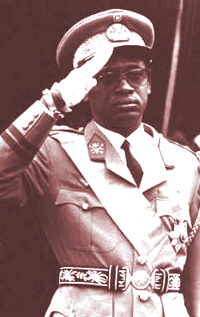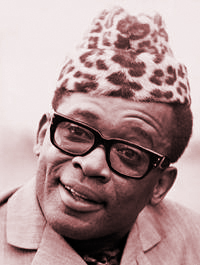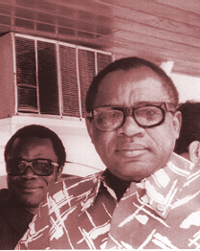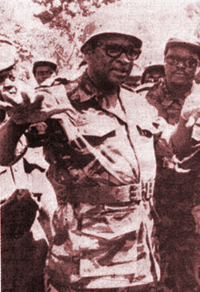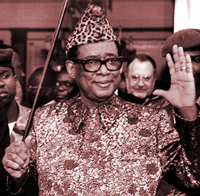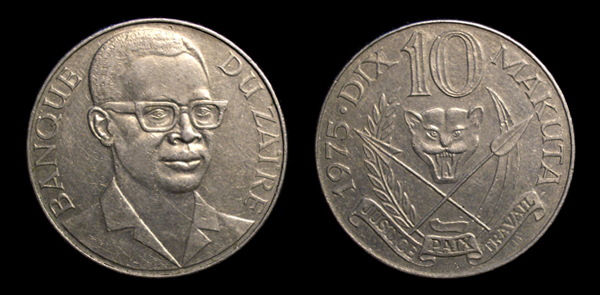
10 MAKUTA COIN - ZAIRE (DRC) - DEPICTING MOBUTU SESE SEKO
(KM 7)
Date: A.D. 1975
Obverse: Portrait head forward right - BANQUE DU ZAIRE
Reverse: Coat of arms of Zaire and the national motto - 1975 DIX 10 MAKUTA / JUSTICE PAIX TRAVAIL (Justice, Peace, Work)
|
Mobutu Sese Seko was born Joseph Désiré Mobutu on October 14, 1930 at Lisala, Equateur province in the Belgian Congo. His father was Alberic Bemany, a cook and domestic servant who died when Mobutu was young. His mother was Marie-Madeleine Yemo, a hotel maid. A somewhat troubled child from a humble background, Mobutu attended catholic schools sporadically as his mother moved them frequently. By most accounts he was bright, exhibited a keen (if not sometimes misguided) intellect, and managed to receive a fairly good education in the various catholic missionary schools he attended in his youth. A precocious young man he was often reprimanded for unruly or insubordinate behavior and was eventually expelled from school receiving a disciplinary conscripted into the Force Publique (the colonial army of the Belgian Congo) in 1950. Bright, fairly well educated, and fluent in French he was trained as an noncommissioned officer and given a desk job as an accountant at army headquarters in Kinshasa. By the time of his discharge he had risen to the rank of sergeant-major, the highest rank allowed to natives of the Congo under colonial rule. More importantly he had established important military connections that would serve him well in the future. Having written some for army periodicals, upon leaving the military he worked as a journalist writing under the name 'de Banzy' and rising to the position of editor at the weekly publication 'Actualités Africaines'. He received training at the official Congo Information Office and moved to Belgium for at time where he attended the Brussels School of Journalism. As a journalist and an educated native of the Congo studying in Belgium, he made more useful connections, this time with political revolutionaries, wealthy business men, the powerful elite at home in Kinshasa, and other groups that had an interest in the fate of postcolonial Congo. While living in Brussels Mobutu attended Conferences concerning the independence of the Belgian Congo. He made contacts within the CIA, met with financial backers, and developed friendships with people like Patrice Émery Lumumba, an anti-colonial leader who was at the forefront of the independence movement and would soon become the first legally elected Prime Minister of the Democratic Republic of the Congo. Mobutu returned to the Congo shortly before independence was declared on June 30, 1960, an event that would throw the new nation into chaos. Lumumba took office and was to serve along side the first president Joseph Kasavubu. The two men represented very different political factions with different visions regarding the nature of the new state. The new nation suffered from rampant factional conflict between as many as 50 political parties vying for control of the new nation willing to do almost anything to obtain it. With conflict down tribal lines and a general mutiny in the military ranks the country was in a state of anarchy. Mobutu rose quickly under these circumstances being promoted by Lumumba to the rank of colonel and chief of staff of the Congolese army. Political tensions came to a head when the prime minister and the president attempted to remove each other from office for various offenses and the already crippled government collapsed. By now Mobutu had consolidated enough political and military power to remove both leaders and set up an interim government with himself as president. Soon after being removed from office Lumumba would die under suspicious circumstances. Mobutu would be implicated in his death, accused by some of delivering Lumumba to to his enemies, a charge he denies. Mobutu declared Lumumba a national hero. After a very brief rule Mobutu returned the government to civilian hands in 1961. A federalist government was implemented and the scramble for control of the nation and endless factional conflict returned. The result was four more years of political instability ending in yet another conflict between heads of state resulting in deadlock and a another breakdown of government. Mobutu, with the backing of the military, again removed the two politicians and took control of the country becoming president in 1965, this time he outlawed political parties identifying them as the root of the nations problems. He founded the MPR (the Mouvement populaire de la revolution), the only legal political party and all citizens were members. His stated goal was national unity, long term stability, and developing the nations economy. In the end what he would achieved during his over 30 years in power was an all pervasive cult of personality and a police state. Like most dictators he lived lavishly as large numbers of his people suffered in crippling poverty. He took complete control of the media which allowed him to constantly bombard the populace with political rhetoric and praise for his benevolence and wisdom through radio, TV, and the newspapers. Looking upon his people as children he admitted to controlling the media in his nation calling it "an excellent vehicle for educating the masses." adding the warning "The people must not be left to the mercy of the media, which over time and without their knowledge may sow the seeds of strife and discord." In essence he controlled the media for the good of the common man. He developed the 'doctrine of authenticity' which he hoped would bring about unity and a strong national identity. He introduced a new flag and national anthem and as part of this new ideology he set out to rid his nation of non-African influences, to 'Africanize' the country. In 1965 he renamed the capitol of Léopoldville (named after King Leopold II of Belgium) to Kinshasa and changed the country's name to Zaire (meaning river) in 1971. All western names were replaced with African names. Buildings, streets, the currency, even the people were required to adopt new African names. Mobutu adopted the name Mobutu Sese Seko Nkuku wa za Banga which which means "all-conquering warrior who goes from triumph to triumph." What would be known as 'Mobutuism' was the end result of his social and political reforms. A cult like worship of Mobutu and adherence to his teachings became like a national religion. Like a parent guiding his children, Mobutu knew best what was good for his people, what they should believe, what they should and should not read and watch. What they should believe is exactly how he believed, what they should read about and watch on TV was him, what they should listen to on the radio was is his speeches and lectures. For a time the front page of the state run newspaper ran a picture of Mobutu every day and his image and his wisdom dominated the airwaves. He was referred to in the state media by various grand titles such as 'Father of the Nation' or 'the Helmsman.' Whether his intentions were initially honorable or selfish, whether he did what he did to save his nation from anarchy or to garner power and wealth is irrelevant, in the end his rule was oppressive and it became increasingly corrupt as the years went by. By 1985 his country was billions of dollars in debt yet his personal wealth was estimated to be in the billions. Although he disputed this figure it is estimated that roughly 20 percent of Zaire's national budget was devoted to "Presidential Services" and he was the majority shareholder in the Banque du Kinshasa, with interest and holdings in a wide variety of different companies who operated within his country by his consent alone. By the early 90's Mobutu's totalitarian regime was facing growing dissent as illegal political parties began to form and protests were staged in opposition to his one party rule. In response Mobutu offered concessions in an attempt to curb the growing unrest. He announced the change to what he called the "Third Republic" were there would be three legal political parties (one being his MPR) and although he continued to serve as president, he resigned from many of his positions in government and as head of the MPR. He set up a commission to draft a new constitution, held elections, and loosened his grip slightly on the nations media. It was far too little, far too late, token gestures at best as power in the country still rested with Mobutu. A number of factors led to Mobutu's eventual downfall in 1997. Problems in neighboring Burundi and Rwanda resulted in floods of refugees into the country, the chaos aided the anti-Mobutu forces which had returned with a vengeance. A perpetually ailing economy and decades of rampant corruption prompted rebels within the country and in exile, led by Laurent Kabila, to finally rise up against Mobutu's rule. The Rebel forces advanced quickly encountering little resistance taking the capital and proclaiming Laurent Kabila President. The country was again renamed as the Democratic Republic of the Congo and Mobutu was forced to flee the country with his family. His destination was Rabat, Morocco where he had old friends and connections. He died of prostate cancer in September 7, 1997, just months after his defeat and exile. The people gained no relief from political and social unrest, corruption, and repression under the presidency of Kabila who was assassinated in 2001. Mobutu refused to accept his ouster and continued to refer to himself as the President of Zaire until his death. An obituary published by the New York times offered this assessment of him: "He built his political longevity on three pillars: violence, cunning and the use of state funds to buy off enemies. His systematic looting of the national treasury and major industries gave birth to the term "kleptocracy" to describe a reign of official corruption that reputedly made him one of the world's wealthiest heads of state." Mobutu was Intelligent and ambitious. Able to maintain intricate networks of loyal supporters, financiers, and businessmen. With total control of the nations military, media, finances, foreign policy, domestic policies, economic interests, natural resources and its industry, Zaire was more like the personal estate of Mobutu, its treasury his personal bank account, its people his children and servants. Mobutu brought unification and a modicum of stability to a nation, plagued from its inception with crippling political and social conflict, by outlawing politics and forcing on his people one all encompassing ideology. In the end when the unity was no longer forced on the people, and when political parties returned, so did the endless political and social unrest. |

